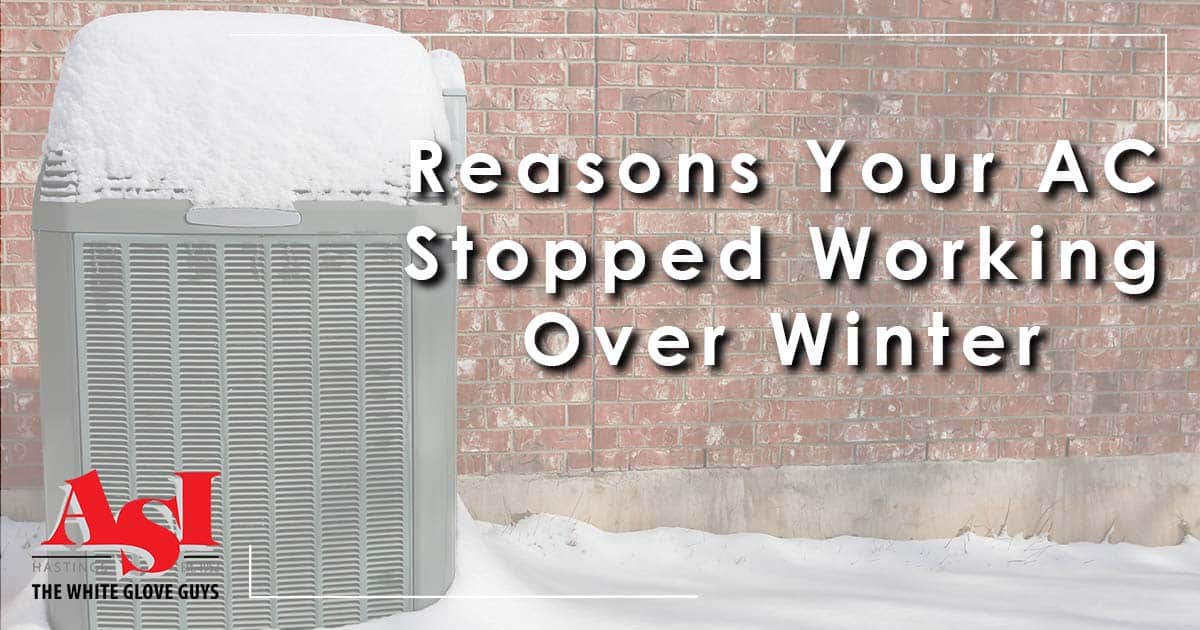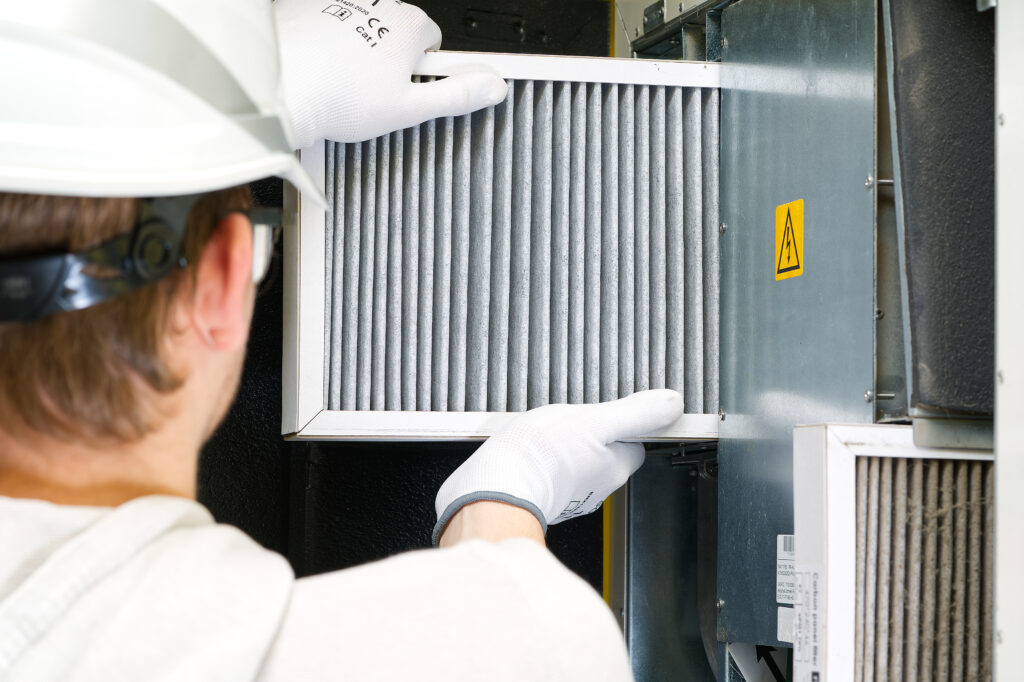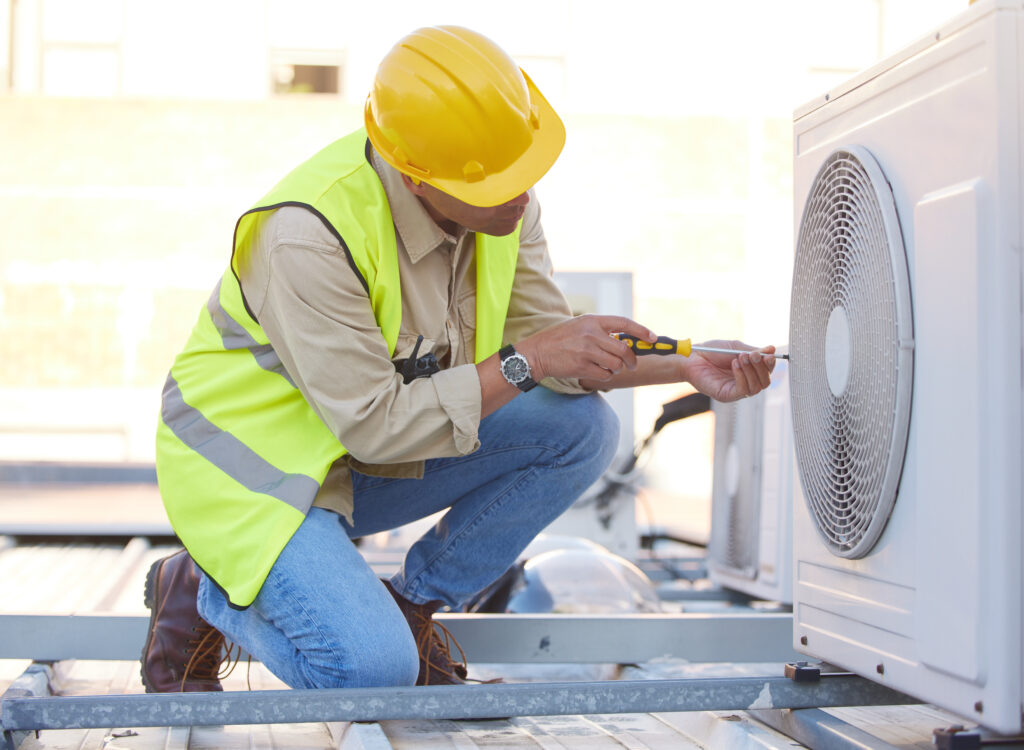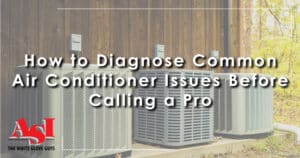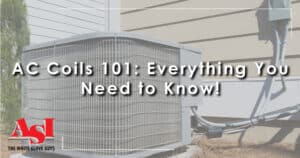If your air conditioner stopped working after resting all winter, don’t be too alarmed. Often the cause is a straightforward reason, but other times, it can signal a significant issue. Here we’ll go over common possibilities and how to prep your air conditioner for use this spring and summer.
Tripped Breaker, Blown Fuse, or Emergency Shutoff
While highly unlikely, it’s possible the air conditioner circuit could have tripped while the unit wasn’t running. Check the breaker box and if the AC circuit tripped, turn the breaker from off to on. If the circuit continues to trip, turn it off and call an HVAC technician or an electrician; this can signal an electrical fault. It’s the same for a blown fuse — replace the fuse if necessary, but call a professional if a new fuse doesn’t resolve the issue.
Weather Damage (from wind and rain)
You don’t need to live in an icy and snowy winter climate to have weather damage to the air conditioner. While the condenser coils remove moisture from the air, the entire condenser unit is moisture sensitive. Repeated exposure to rain and salty air can cause internal parts to rust and corrode prematurely as winter winds drive the moisture into the uncovered condenser. Therefore, the air conditioner’s sensors may trigger a system shutdown until the issue is resolved.
Blower and Fan Failure
The blower motor and fan have a heavy workload in your air conditioner. Working in tandem, they push the cool air into your home. But, the workload can eventually lead to enough wear and tear that one or both components fail. One major sign a failure is imminent are unusual sounds from the unit, such as banging, rattling, or screeching.
Overheating Condenser
As mentioned, not covering the outdoor condenser unit over the winter can cause issues. One issue in particular is yard debris clogging the coils. Since the coils are tucked away inside the condenser, it can be tricky to see them and what is causing the clog. If the coils aren’t unclogged, the condenser may overheat and cause a full system shutdown.
Clogged Air Filter
The air filter has an important role in the air conditioner’s regular function. First, it blocks many particles floating in the air from entering the system, potentially building on wires and sensors. Then, the filter allows an adequate amount of air to enter and exit the system.
Refrigerant Leaks
When the air conditioner turns on and blows air, but the air isn’t cool or cool enough to match the thermostat temperature, you might have a refrigerant leak. Depending on the age of the AC system, the evaporator coils can begin to corrode, causing a leak.
One sign of a refrigerant leak is an air conditioner that runs normally for a little while then stops. If this happens, look at the evaporator coils — if you see frost or ice, you likely have a leak.
Prepare AC for Spring
Clean debris around the condenser
Branches, leaves, sticks, and other yard debris can be blown around by winter storms. Before turning on the air conditioner this spring, take the time to clean any debris around or in the condenser. If you plan on updating the landscaping, keep the following note in mind.
The general guideline is to keep at least two feet of clear space around each side of the condenser. The clearance allows enough air to circulate for the unit to have appropriate ventilation and temperature regulation.
Inspect and repair the ductwork
Ductwork is the network within your home that carries conditioned air to each room. Sometimes the ducts develop rips and tears over time, creating air leaks that inhibit efficient air flow. A professional inspection will find any issues while a technician repairs them.
Change the air filter
You already know how important an air filter is for your air conditioner’s efficient function. Make a note or set a reminder to change the air filter every two to three months, or more frequently if you live in a dusty environment.
To find what size of air filter you need, look at the sides of the existing filter. You should see the filter dimensions; most department and hardware stores carry air filters for purchase.
Schedule a tune-up
Even if you keep an eagle eye on how your air conditioner operates, a maintenance tune-up will make sure the system is at its peak this spring and summer. An HVAC technician looks over the entire system, indoors and outside, for any existing problems and potential issues and makes repairs as necessary.
If your air conditioner doesn’t turn on because of any of these reasons, contact ASI Hastings Heating, Air and Plumbing today for timely repairs.

